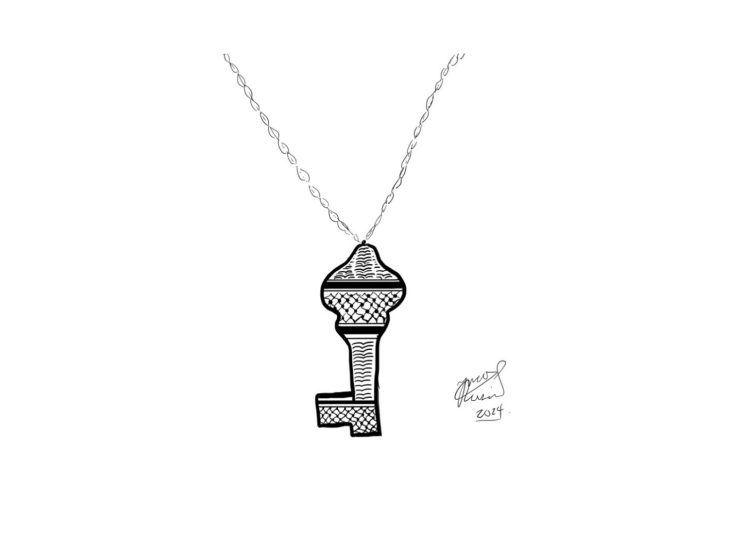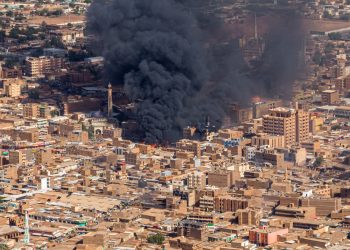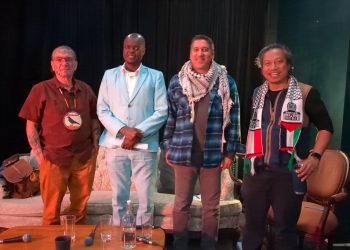On Saturday, June 22, Ahmed Abu Shawish spoke at the student encampments at Western University. A Nakba survivor who served in the Palestinian Liberation Organization (PLO), Shawish, speaking in Arabic translated by an attendee into English, delivered a critique of the history of Zionism – the movement that led to the creation of Israel.
The Nakba – “the catastrophe” – refers to the ethnic cleansing of Palestinians in 1948 by Israeli forces. Thousands of Palestinians were ousted or killed; their homes were stolen, their villages destroyed; and millions were sentenced to refugee status. Laws were passed denying Palestinians the right to land ownership, to work, to move freely in their land, to return to Palestine; and nullifying Palestinian citizenship and passports.
Shawish was eight years old when the Nakba happened.
The PLO, which Shawish served in for thirty years, was founded in 1964 as an overarching political group encompassing several political parties. It was conceived with the intention of liberating Palestine from Israeli occupation and ensuring the return of Palestinian refugees.
Shawish began his talk by commending the encampment for “playing an important part by supporting us all, by supporting our cause, your cause, the cause of the people in Gaza. The Palestinian cause.”
He then offered an appraisal of the roots of Zionism – its beginning, its allies, and the circumstances that enabled its rise.
He argued that the Levant region – modern-day Lebanon, Syria, Jordan, and historic Palestine – has been marred by conflict since the “beginning of history,” enduring invasion from the Persians, the Mongols, the Crusaders, the Greeks, and the Romans. Throughout these wars, the indigenous people remained.
“What is significant about these conflicts is that the world’s powerful nations’ ambitions were always to occupy this part of the world, because this land is considered the centre of the world,” he said. “They are greedy in wanting to expand.”
Shawish described the 19th century as an era of “pure colonialism” by Europeans in the Middle East, Africa, and parts of Asia. Egyptian ruler Muhammad Ali captured the region of Palestine from the Ottoman Empire. The Levant returned to the Ottoman Empire – in which Britain enjoyed political power – after European forces brokered a deal with Ali.
Shawish argued that Lord Shaftesbury, a British politician, conceptualized Zionism to ensure a perpetual British ally – and foothold – in the region.
“Shaftesbury was a strategic thinker. He thought of a way to guarantee power all the time,” said Shawish. “He came up with the idea that you’ve probably heard and keep hearing – a land with no people for a people with no land.”
He argued that Lord Palmerston, the British minister of foreign affairs, approved the plan. He said that, with the knowledge that Palestine was considered the Jewish “promised land”, all British efforts were poured into expelling Jews to Palestine. They created a consulate in Jerusalem; they created a fund to send engineers, archaeologists, and other experts to study all aspects of Palestinian life. These efforts were cast beneath the ideology of “Zionism.”
“It wasn’t the Jewish people who started this,” says Shawish. “It was Britain that created Zionism.”

Shawish emphasized that Jews themselves had never sought life in Palestine: in their history of expulsion from European countries, they fled elsewhere.
He gives examples of how Jews sought refuge in Morocco after their expulsion from Spain in the 15th century; how Jews did not enter Palestine after their expulsion from Russia in the 19th century; how Jews travelled to the Americas after the French Revolution.
“The Jewish people didn’t think of going to Palestine, even though there were no borders, no visas needed or passports – they could have just boarded ships and gone to Palestine,” said Shawish.
In fact, for Shawish, Zionism masks the history of Jewish indigeneity in Palestine: “There were Jewish Palestinians… just like any other Palestinian who existed for thousands of years,” said Shawish. “Palestinians used to tell stories about how they all lived and played together as children, they went to schools together.”
When Britain formally assumed authority over Palestine after World War One, Herbert Samuel, a British Jew, became the first High Commissioner for Palestine. He “opened the door” to immigration to Palestine, backed by an army.
Palestinians resisted, and militant Jewish gangs backed by British weaponry began to seize land. Ultimately, the violence that ensued led to British withdrawal from Palestine. Yet, that in turn was replaced by the United States, who, per Shawish “took the throne” in a new era of imperial hegemony.
Shawish argued that the United States will “never get rid of Israel and will always support it.” But he says that Israeli society has thrived in political, economic, and social planes that have created a range of ideologies. He says “a lot” of Israelis are against Zionism, referencing Israeli historian Ilan Pappé who has written books on Zionism’s violent origins.
“As Palestinians, we are not against Jewish people. We are against the Jewish people who came and stole our land and killed us. We are against those who are killing our people in Gaza.”
Regarding the unfolding genocide in Palestine, Shawish suggested that peace must come in two parts. First, international law must be respected by all countries in the world. Secondly, Palestinians must be given an independent state, the right to return to their lands, and the land they are legally owed according to the United Nations.
“I think if international law made strict laws and forced the Israelis to abide by them, then that’s a beginning to something,” Shawish said. “(But) personally, I think it’s in the United States’ hands. The people of these big, powerful countries should pressure their governments to make this stop.”
But Shawish says that the internal pressure in Israel is novel. Civil unrest within Israel has been building: for nine months, many hostages have not been rescued and Hamas has not been eliminated.
“After all this time, you didn’t get the hostages out, you didn’t get rid of Hamas, you didn’t accomplish anything except the genocide against the civilians,” said Shawish of Netanyahu. “The only person who doesn’t care about this is Netanyahu because of his power trip and greed. Will the war end? Yes, eventually. It will end with Netanyahu’s failure.”
“We’re facing a very, very difficult situation. We’re in a situation where no one can envy us. But this is not the first time that Palestinians have faced something this difficult. It happened to us multiple times before. We will suffer because of the war that’s going on and because of what we’re witnessing. But the Palestinians have not all died yet. Their lives will continue. It’s almost miraculous how this resistance and this faith just keeps on going, regardless of the atrocities that we see.”
This article was written using an English transcript of Ahmed Abu Shawish’s talk. The English transcript was created by Rana Abbout from an Arabic recording of the talk.
The last quote by Shawish in this article was translated from Arabic into English by an encampment attendee.
Incé Husain is a neuroscience graduate student and journalist who writes for the NB Media Co-op. She pursues local stories independently at The Unprecedented Times. She is based in London, Ontario.
For further reading on the history of Zionism that elaborates on the content in this article, see the following books:
- The Hundred Years’ War on Palestine: A History of Settler Colonialism and Resistance, 1917-2017 by Rashid Khalidi (2020)
- Beyond Chutzpah: On the Misuse of Anti-Semitism and the Abuse of History by Norman Finkelstein (2005)
- A History of Modern Palestine: One Land, Two Peoples by Ilan Pappe (2004)
- The Non-Jewish Jew and Other Essays by Isaac Deutscher (1968)
For further information on the history of Zionism that elaborates on the content in this article, see the following podcast episodes:
- Empire: Episode 38 – Sykes-Picot: Carving up the Middle East (Podcast by by William Dalrymple and Anita Anand)
- Empire: Episode 39 – Lawrence of Arabia and the Arab Revolt (Podcast by by William Dalrymple and Anita Anand)
- Empire: Episode 40 – Origins of the Israel-Palestine Conflict (Podcast by by William Dalrymple and Anita Anand)








